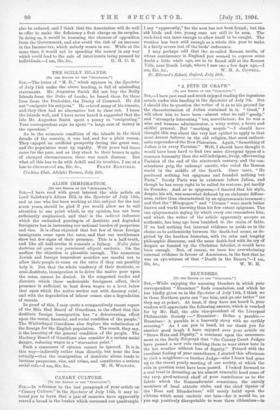" A FETE IN CRAPE. "
[To THE EDITOR OF TEE " SPECTATOR."] SIR,—I have just read and much enjoyed reading the ingenious' article under this heading in the Spectator of July 7th. But I should like to question the writer of it as to his ground for the characterisation of Julian contained in it, " Good," I will allow him to have been—almost what we call " goody," and "strangely interesting" too, nevertheless ; for he was a. wise and humane administrator, a witty writer, a brave and skilful general. But "mocking sceptic "—I should have thought this was about the very last epithet to apply to that most devout believer in the old religion, that most enthusi- astic expounder of the New Platonism. Again, " Something of Julian is in every Parisian." Well, I should have thought it• would have been hard to find two more divergent types of a common humanity than the self-indulgent, lively, effervescing Parisian of the end of the nineteenth century, and the con- scientious prig, the unkempt ascetic, who ruled the Roman world in the middle of the fourth. Once more, " He produced nothing but epigrams and founded nothing but Paris." Surely Paris was in existence before Julian, and though he has every right to be called its restorer, yet hardly its Founder. And as to epigrams,--I fancied that his style,. despite his wit, was somewhat defaced by an elaborate diffuse- ness, rather than. Characterised by an epigrammatic terseness ;. and that the "Misopogon " and " Otesars " were much better known and worth knowing than his few extant epigrams. The one epigrammatic saying by which every one remembers him, and which the writer of the article apparently accepts as authentic, has long ago been banished to the realm of fable.. If we had nothing but internal evidence to guide us in the choice as to authenticity between the death-bed scene, as de- picted by the heathen historian, with its calm and lengthy philosophic discourse, and the same degth-bed with its cry of despair as fancied by the Christian fabulist, it would have been enough. But, of course, we have too overwhelming external evidence in favour of Ammianus, in the fact that he. was an eye-witness of that "Death in the Desert."—I am,

































 Previous page
Previous page